Starmer remains ahead of Farage in head-to-head of who would make best PM, but majority of Britons unsure what he stands for
New data from Ipsos's Political Pulse survey reveals that while Prime Minister Keir Starmer continues to lead Nigel Farage in a head-to-head of who would make a better Prime Minister, just over half (53%) of Britons say that it is not clear what he stands for.
Favourability towards politicians
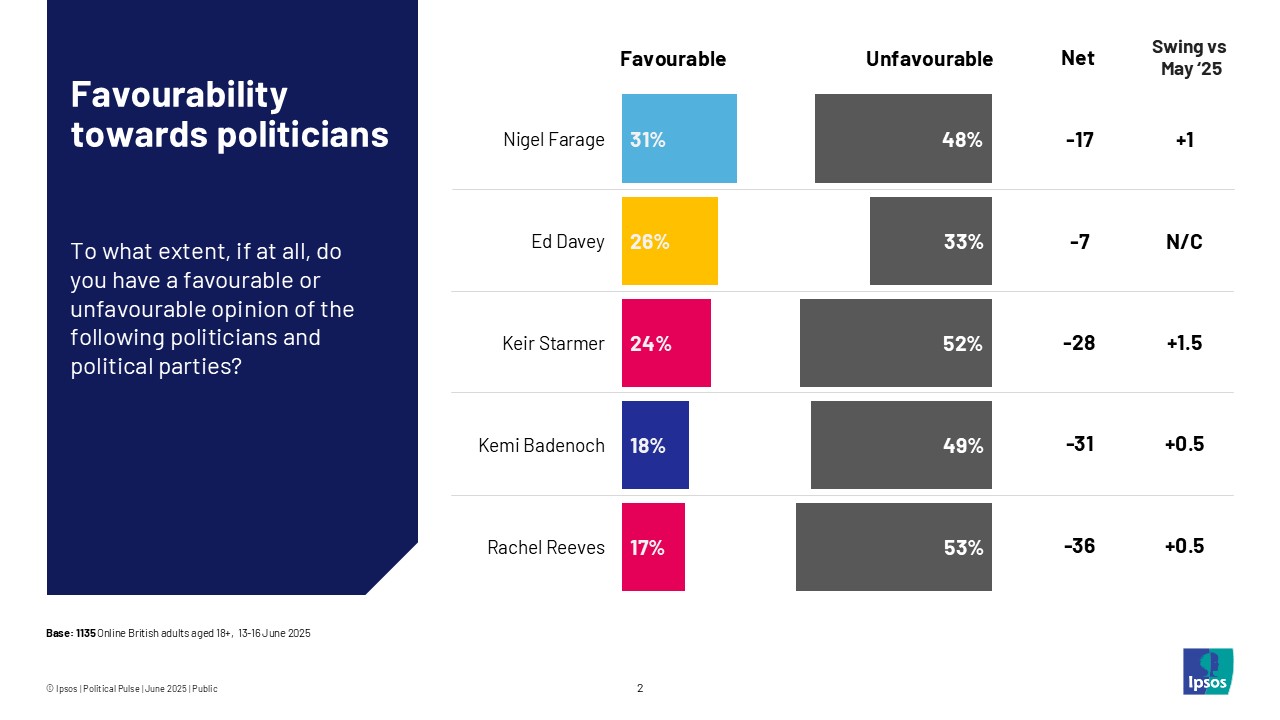
- Reform UK leader Nigel Farage has a net favourability of -17, with 31% viewing him favourably and 48% unfavourably.
- Prime Minister Keir Starmer's net favourability stands at -28 (24% favourable, 52% unfavourable).
- Leader of the Opposition Kemi Badenoch has a net favourability of -31 (18% favourable, 49% unfavourable). This unfavourability score is equal to last month’s and continues to be her lowest as Conservative leader.
- A quarter (26%) hold a favourable view of Liberal Democrat leader Ed Davey, while a third (33%) are unfavourable, giving him a net score of -7. Davey continues to have the lowest amount of unfavourability of any politician polled, but four in ten (41%) say they don’t know.
- Following the Spending Review, Chancellor Rachel Reeves has not seen significant change to her favourability, with a net rating of -36 (17% favourable, 53% unfavourable, +0.5 from last month).
- In a head-to-head with Nigel Farage, Keir Starmer continues to lead on who the British public think would make a better Prime Minister (32% Starmer vs 26% Farage) – although his lead is down compared to in March (Starmer +6 June vs +11 in March).
- Starmer also continues to lead in a head-to-head with Kemi Badenoch (28% Starmer vs 16% Badenoch).
Clarity of leadership
- Almost two-thirds of Britons (64%) say it is clear what Nigel Farage stands for. Ed Davey and Keir Starmer are on 37% each, with Badenoch on 35%. Just over half (53%) say that it is not clear what Starmer stands for.
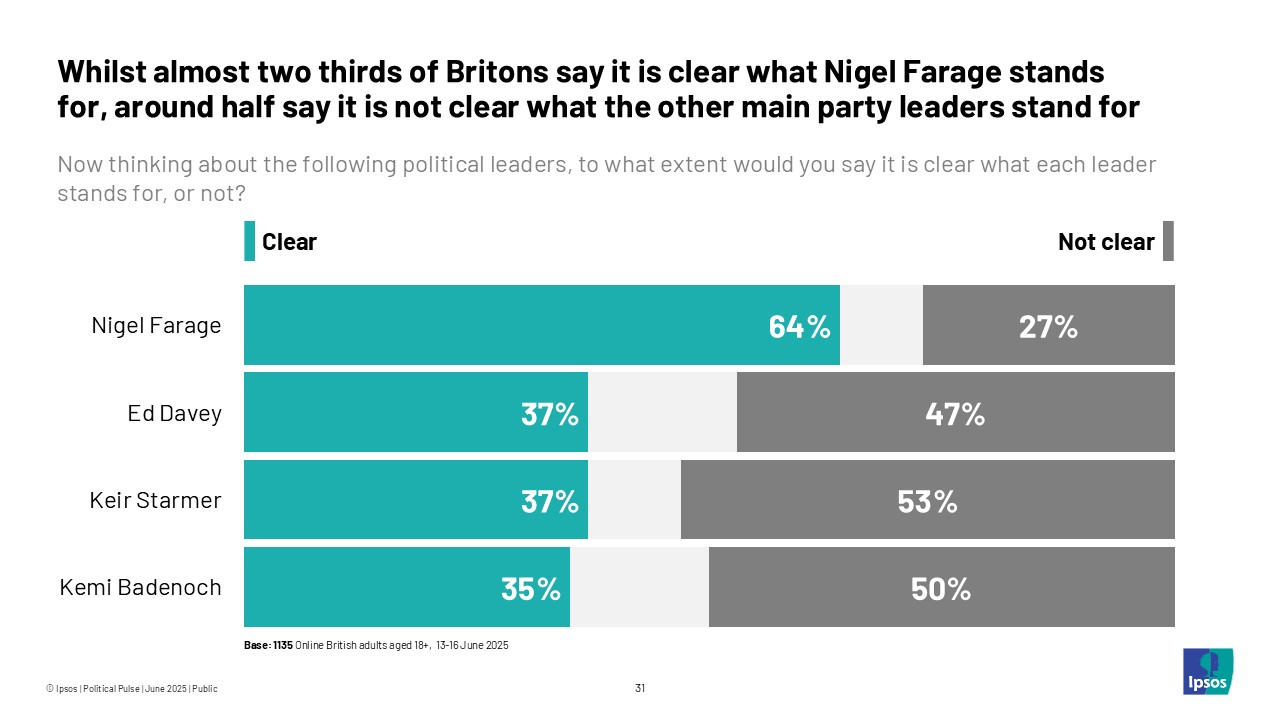
Favourability towards political parties
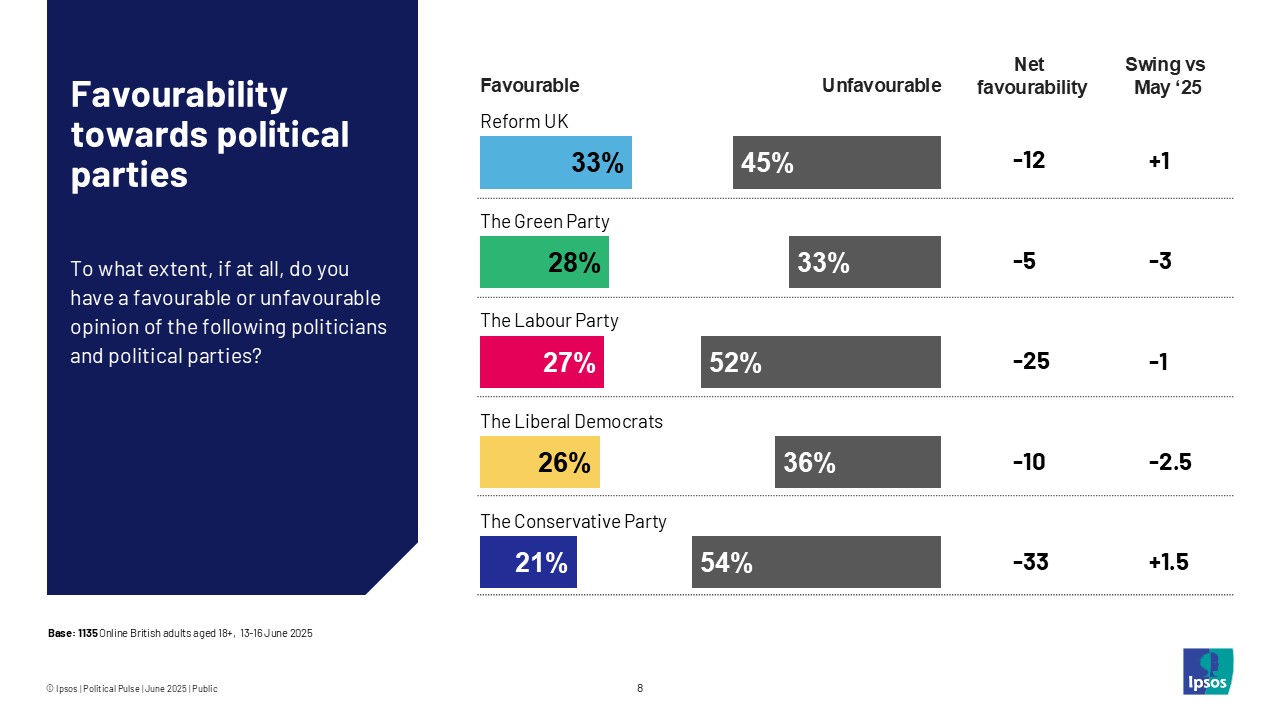
- 27% continue to be favourable towards the Labour party, unchanged from last month. 52% are unfavourable, giving a net favourability rating of -25.
- Two in ten (21%) express a favourable view of the Conservative party, with 54% unfavourable. This gives them a net rating of -33, up slightly from -36 last month.
- The Green Party’s net rating is -5, down from +1 last month. 28% (down from 31% in May) are favourable towards the party, while a third (33%) are unfavourable.
- The Liberal Democrats sit at -10, down from -5 last month. 26% express a favourable view and 36% unfavourable.
- Reform UK has a net rating of -12 (a marginal improvement from -14 last month). 33% hold a favourable view of the party, with 45% unfavourable.
Likelihood to consider voting
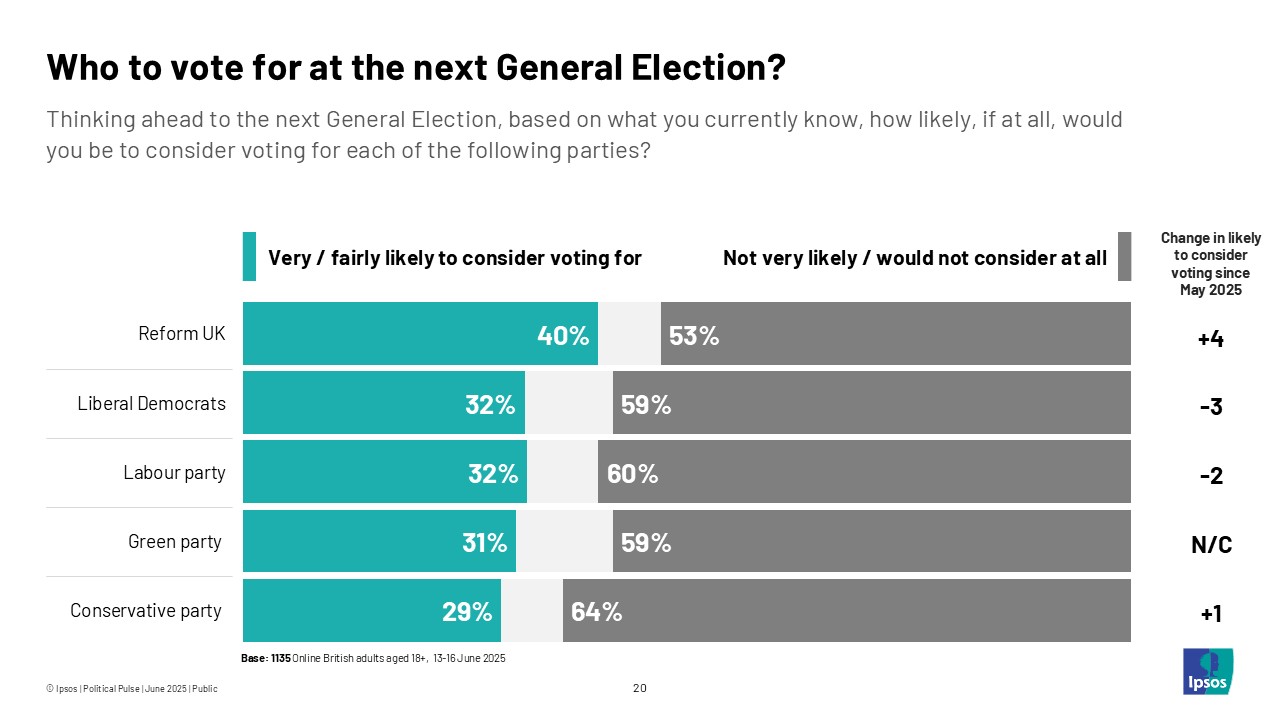
- Four in ten (40%) say they would consider voting for Reform UK, while just over half (53%) say they would not.
- 32% each say they would consider voting for Labour and the Liberal Democrats, with 60% and 59% respectively saying they would not.
- Three in ten (31%) say they would consider voting for the Green party, while 59% say they would not.
- 29% say they would consider voting for the Conservative party, while 64% say they would not.
- Among those who voted Labour at the last General Election, seven in ten (70%) say they would consider voting for the party again, while a quarter (25%) would not. Among those who voted Conservative, nine in ten (89%) would consider voting for the party again, while 10% would not.
- 54% of Conservative voters say they would consider voting for Reform UK, while 43% would not. Three in ten (30%) Labour voters say they would consider voting for Reform UK, while 68% would not.
Key issues
- Healthcare/the NHS (60%), inflation (54%), and immigration (46%) continue to be the issues that Britons say will be most important to them when deciding their vote at the next election.
- The Labour government continues to be in net negative for performance on all of these issues, with majority saying they are doing a bad job on the cost of living (62%), immigration (59%), and managing the economy (54%).
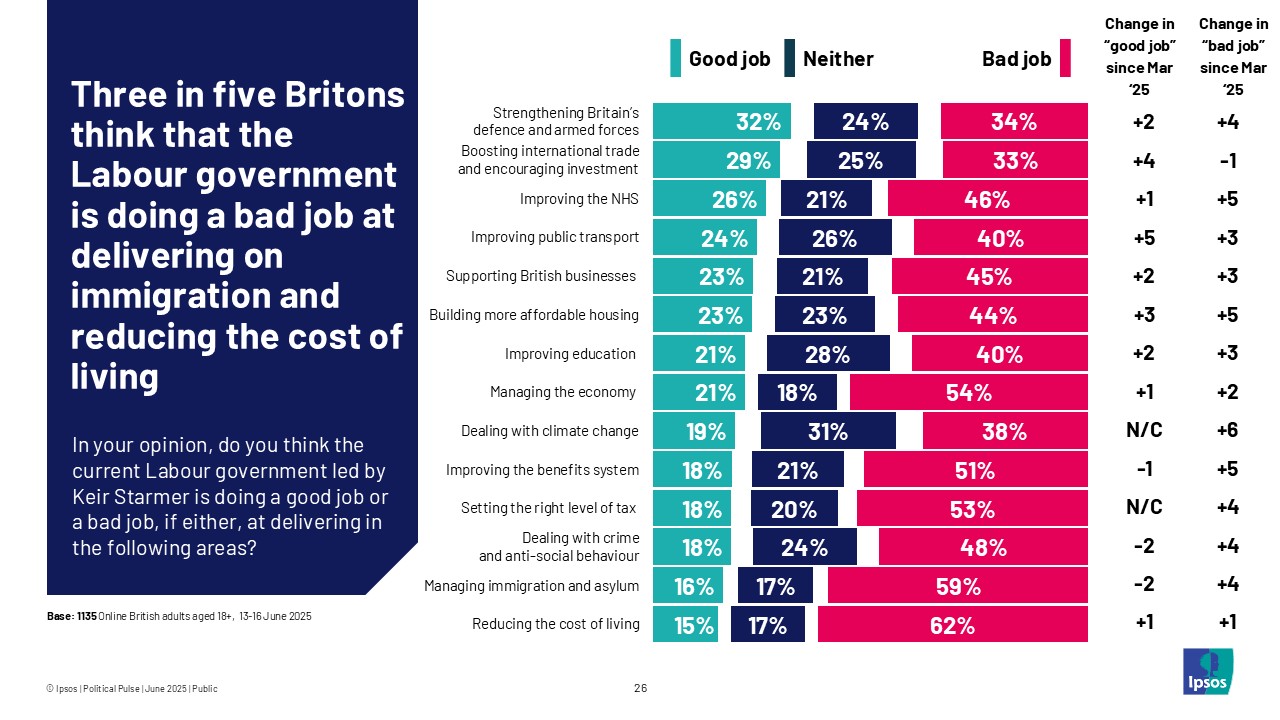
- Labour is most trusted to improve the NHS, build affordable housing, strengthen Britain’s defence and armed forces, improve education, and boost international trade.
- Conversely, Reform UK is seen as more capable of dealing with crime, supporting British businesses, and managing immigration.
- The Green Party is most trusted to deal with climate change (Greens 23% / Labour 14%).
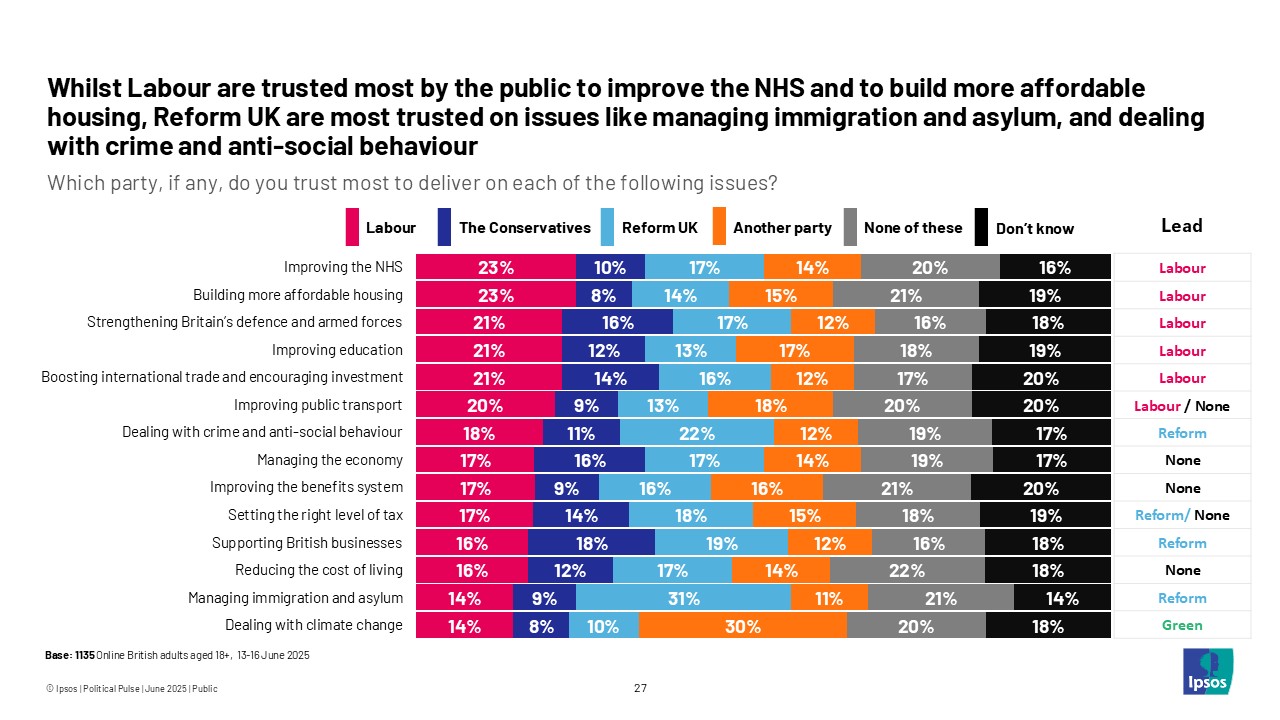
Government performance
- Over half (56%) of the British public continue to be disappointed by what Labour has done in Government so far.
- 58% say the country is heading in the wrong direction, while two in ten (20%) say right direction. This is a net negative rating of -38, up slightly from the -41 rating recorded last month.
- When asked to score the government’s performance on a scale of 0-10, The Labour government receives an average performance rating of 3.9 out of 10. 45% of respondents rate the government's performance between 0-3, while only 22% give a rating of 7-10.
Keiran Pedley, Director of UK Politics at Ipsos said:
These findings show how much the world has changed since Labour’s General Election win last year. A majority of the public are unfavourable towards the Labour Party and its leader Keir Starmer, with Reform UK ahead in the polls and the Conservatives showing little sign of recovery.
On the key issues, Labour is still most trusted on the NHS and Reform UK are most trusted on immigration. However, on the key issues of the economy and cost of living, no party stands out as most trusted, despite a majority of the public saying Labour are doing a bad job on these issues. This data – and the fact the parliament is still young – suggest the future is all to play for despite Labour’s current struggles.
Technical note:
- Ipsos interviewed a representative sample of 1,135 adults aged 18+ across Great Britain. Interviews were conducted online between the 13th-18th June 2025.
- Data are weighted to match the profile of the population. All polls are subject to a wide range of potential sources of error.




